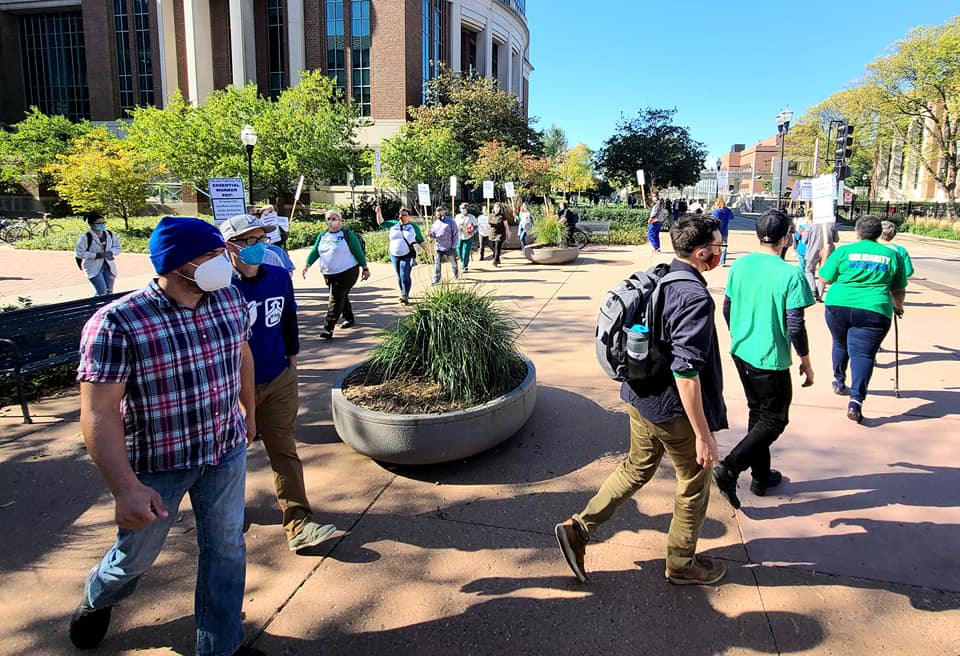
AFSCME 3800/Facebook
AFSCME 3800/Facebook

Share
The maroon and gold that typically adorn the University of Minnesota’s campuses have been spiked with AFSCME green this fall, as frontline workers make a public push for higher wages and other demands in contract talks with the school.

Clerical, technical and health care workers, members of the American Federation of State, County and Municipal Employees, have been in bargaining with the university since May. Their previous, two-year contracts expired June 30.
But the slow pace of negotiations has prompted unions to begin putting public pressure on the U to get serious about their demands.
AFSCME members staged rallies on the Twin Cities and Duluth campuses Sept. 22 and, two weeks later, marched on a Board of Regents meeting. Tomorrow, Oct. 19, workers will hold informational picketing from noon to 1 p.m. on the corner of Delaware St SE and Church St SE, near Boynton Health Services.
Union members say they will keep the heat on the university until its words of support for frontline workers translate into real gains at the bargaining table.
“The U is interested in image,” Local 3800 President Cherrene Horazuk said during a rally last month on the steps of Coffman Memorial Union. “U of M AFSCME is interested in substantive change. That’s why we’re here today.”
Demanding pay and respect
Wage raises and “essential pay” are among AFSCME locals’ top demands in bargaining.
All workers deserve wages that keep up with the rising cost of living, the unions say, and workers who kept the university running during the pandemic deserve “tangible appreciation for risking our lives,” said Deb Pavlica, the president of Local 3260 and a nurse at Boynton Health Services.
“The Board of Regents all stayed home safer. President Gable, management, leadership all stayed home safer,” Pavlica said. “But they sent us to the frontline for an extra $16 a day for less than three months…
“We want raises and compensation that acknowledge our sacrifices.”
Beyond higher pay, workers are pushing for contract language that would keep in place remote and flexible work schedules introduced at the start of the COVID-19 pandemic. Their demands also include a formal process for appealing management decisions related to remote work.

Diane Blumenfeld, a clerical worker in the university’s dentistry program, said all workers should have the right to “meaningful flexibility” in their work schedule. “During the last year and a half, we have proven that we do not need to be physically in the office to do our jobs well,” she said.
Other AFSCME members at the Sept. 22 rally demanded a more robust Regents Scholarship program for U of M employees. Sarah Vast, a transgender, nonbinary worker, called on the university to do more to make its workplaces “safe, healthy and just for workers of all identities, needs and abilities” and described having to “walk three buildings away to use a restroom that is safe and comfortable.”
Lei Simmons, a clerical worker at Masonic Cancer Research Center and member of Local 3800, demanded the contract reflect a commitment to racial and social justice that goes beyond “diversity training” and begins the work of addressing and eliminating bias.
“The University of Minnesota has a history of turning that blind eye. We have a history of managers rationalizing and justifying behaviors that demean people,” Simmons said. “Each person that is at the university as a student and as a worker has the right to be respected.”
Support and solidarity
University students and non-AFSCME staff joined the rally in support of the workers’ contract campaign. Members of other unions – including the Communications Workers (CWA), Service Employees (SEIU) and Education Minnesota – also showed their solidarity.
“We support the workers here fighting for what’s right,” CWA Local 7250 President Kieran Knutson said. “No business as usual until there’s justice for the workers.”
Greg Namacher, president of SEIU Local 26, noted that U of M AFSCME members supported janitors when they went on strike in February 2020.
“It is critical that we stand with each other when we’re fighting for what’s right, especially in this moment,” he said. “It is also critical that we stand together to push the university to be an engine of economic and racial justice – and not an impediment to it.”

